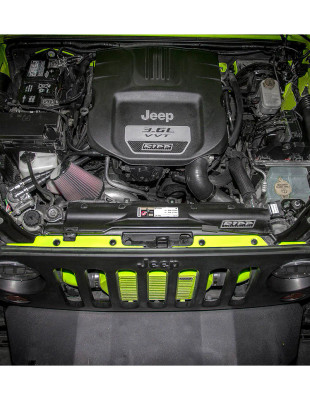Oil catch cans are simple devices that can increase performance of any engine. The 3.6L Pentastar engines found in your Jeep Wrangler or V6 Mopar vehicles will greatly benefit from the use of a catch can as they are notoriously known for excessive blow-by gas. Not all catch cans are created equal and though there are many designs the RIPP Catch Can System shines above all the rest.
Here's why they're beneficial to your engine and how a catch can works.
Your engine relieves pressure from the crankcase through a hose that connects the valve cover to the intake manifold. This pressure is commonly referred to as "blow-by". The ventilation of blow-by gases allow oil and gunky condensation into the intake manifold. This actually leads to more serious issues like contaminated intake air and carbon build up around your intake valves. Contaminated air is when the crank case fumes actually mix with clean air thus lowering your octane. This leads to pre-ignition or pinging. This will cause issues with tuning and overall engine power. Even worse these contaminants will start to build up inside the intake runners and valves. When left unchecked this buildup can hurt fuel economy, horsepower, and can even cause misfires. A Forced induction engine will naturally have more blow-by gas, so if your vehicle is supercharged this catch will help control it.
Fig1. Contaminated intake valves on a 3.6l pentastar engine. (Using a catch can will avoid oil ingestion, and carbon build up on intake valves)

Adding a catch-can will prevent oil and other contaminants from causing buildup inside your engine. Essentially the catch can will act as a collection system. Installed into the crank-case ventilation hose to "catch" the contaminants before they can reach the intake manifold. The RIPP catch-can is focused on filtration and baffling. The RIPP Catch Can System (RCCS) has an integrated baffle plate and a Sintered Bronze Filter which acts as a liquid/fume separator creating an extra layer of filtration. This cleans the fumes as they pass from that can into your intake. With the RIPP Catch Can System you are covering all your bases to make sure you're getting the best filtration and separation on the market all it a package that's easy to own and maintain.
Optimal Catch Can Performance:
Achieving the best filtration and managing engine blow-by is a process influenced by variables and factors such as engine mileage, driving style, fuel quality, engine oil quality and viscosity, vehicle location and environment, temperature, humidity, and engine temperatures.
To maintain your catch can effectively:
-After installing the catch can, closely observe and document the liquid collected in the can over the initial 500 miles.
-Periodically inspect the catch can to assess the accumulation of contaminants. -Adjust the frequency of inspections based on the variables mentioned above.
-Use the 500-mile measurement as a benchmark to establish service intervals. This proactive approach ensures timely maintenance and sustained catch can effectiveness.
By understanding and adapting to these variables, you empower yourself to make informed decisions about catch can maintenance. Regular monitoring and documentation are key to maximizing the benefits of your catch can system and preserving your engine's long-term health.













